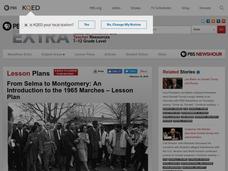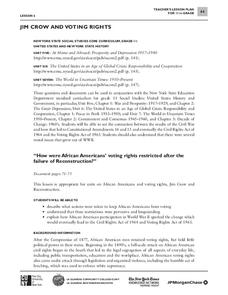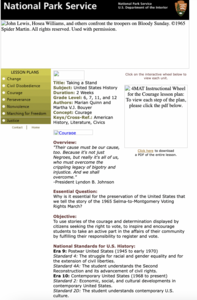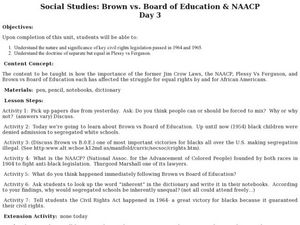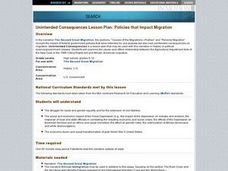Stanford University
Civil Rights or Human Rights?
Young citizens consider the American civil rights movement as part of the global struggle for human rights. After using a timeline activity to learn about the major events in the civil rights movement, class members study Malcolm X's...
iCivics
The Road to Civil Rights
Here is a fantastic resource on the civil rights movement! It includes reading materials and worksheets, and particularly highlights major legislation and the role of the judicial branch in the federal government in addressing the...
Teaching for Change
A Documents-Based Lesson on the Voting Rights Act
How did the Voting Rights Act affect the daily lives of American citizens? A document-based lesson developed by the Student Non-Violent Coordinating committee (SNCC) presents a case study of the impact of the Voting Rights Act of 1965 on...
PBS
From Selma to Montgomery: An Introduction to the 1965 Marches
The 1965 Civil Rights marches from Selma to Montgomery and the resulting Voting Rights Act of 1965 are the focus of a social studies lesson. The resource uses film clips to inform viewers not only about the discrimination that gave rise...
Anti-Defamation League
Martin Luther King, Jr. and Civil Rights
How far have we come and how far do we still need to go to achieve equality and full civil rights in the United States? Include a packet of materials collected in your observance of Martin Luther King, Jr. Day.
Curated OER
Laws of Civil Rights
Students investigate the Civil Rights Act of 1964. In this segregation lesson, students explore the rights that were guaranteed by the legislation as well as attempts by southerners to stop African Americans from voting. Students...
National Park Service
The Selma to Montgomery Voting Rights March: Shaking the Conscience of the Nation
Travel back in time to examine how tragic events can spur positive change. Scholars explore the impact of the Selma Voting Rights March, including the tragic loss of life and the later signing of the Voting Rights Act of 1965. Academics...
K20 LEARN
Government and Your Right To Vote: Voting Rights In America
Gaining voting rights was difficult over the course of decades, but the debate over who should actually be allowed to cast a ballot remains. Scholars explore the history of the struggle, including the fifteenth and nineteenth amendments,...
Curated OER
The Journey to Civil Rights
Students explore several significant figures and events of the Civil Rights Movement and sequence the key events to create a timeline. The instructional activity utilizes the story, "The Story of Ruby Bridges," the work of Robert Coles...
Curated OER
Picturing Freedom: Selma-to-Montgomery March, 1965
Students analyze primary sources to investigate the Civil Rights Movement. In this Civil Rights lesson plan, students explore the passage of Voting Rights Act of 1965 and how photojournalism impacted the passage of the legislation....
Curated OER
Race and Representation
Young scholars consider race and representation. In this voting rights lesson, students listen to their instructor lecture on the Voting Rights Act of 1965, Georgia congressional districts, and North Carolina voting districts. Young...
K20 LEARN
LBJ and Voting Rights
Challenges to voting rights is not a new thing. Using President Lyndon B. Johnson's 1965 "The American Promise" speech on voting rights as a starting point, young historians research current voting rights laws and challenges.
City University of New York
Jim Crow and Voting Rights
Class groups examine primary source documents to determine how the voting rights of African Americans were restricted after the failure of Reconstruction, and how African American participation in World War II lead to change.
Curated OER
Race and Voting in the Segregated South
Learners examine the history of African American voting rights. In this voting rights lesson, students listen to a lecture on African American voting rights between the years 1890 and 1965. Learners respond to discussion questions...
Curated OER
The Election of Barack Obama 44th President of the United States
Students consider the historic implications of Barack Obama's election. In this election of 2008 instructional activity, students research Obama's accomplishments and determine how his election signifies the success of the American Civil...
Museum of Tolerance
Making Lemonade: Responding to Oppression in Empowering Ways
An activity focused on tolerance encourages class members to consider how they might respond when they or someone else is the target of oppression and discrimination. After researching how some key figures responded to the anti-Semitism...
Curated OER
Paul Conrad's Perspective on Civil Rights
Students review a political cartoon and discuss desegregation. In this cartoon analysis lesson, 11th graders discuss the impact of a political cartoon and its relation to a Supreme Court case. Students read additional information and...
Curated OER
Taking a Stand - 1965 Selma-to-Montgomery Voting Rights March
Young scholars examine the 1965 Selma-to-Montgomery Voting Rights March. They view pictures reflecting their perceptions of their most important rights as citizens, write journal responses, create collages illustrating courage, and read...
Curated OER
Why Can't I Vote?
Fourth graders take an unannounced test (failure is expected) and the top scores are rewarded with candy bars. They compare this test to the literacy tests given before 1960 and votes to candybars. They journal their responses.
Curated OER
Brown vs. Board of Education and NAACP
Eleventh graders examine the issues surrounding Brown vs. Board of Education. In this American Government lesson, 11th graders study the key civil rights legislation passed in 1964 and 1965.
Curated OER
Unintended Consequences: Policies that Impact Migration
Students examine the cause-and-effect relationship between the Agricultural Adjustment Acts of the New Deal or the 1965 Voting Rights Act and African-American migration. They write an essay evaluating the effectiveness of the Voting...
Curated OER
Court Documents Related to
Young scholars use the National Archives to researcj cout coduments related to Martin Luther King, Jr.
Curated OER
The 36th President: Lyndon B. Johnson, US History
Students research and analyze Lyndon B. Johnson's achievements as the 36th President focusing on his legislative program. They consider how the passage of time can influence a President's reputation.
Curated OER
Lyndon B. Johnson
Learners take a closer look at legislation passed in the 1960s. In this Great Society lesson plan, students research 6 key pieces of legislation signed into law by Johnson. Learners use their findings to write collaborative reports.





